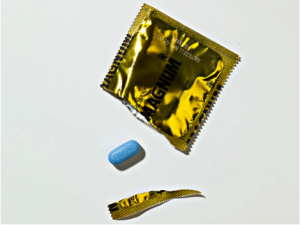There’s No Shame in Being PrEPared: Embracing Pre-Exposure Prophylaxis
Guest Poster: Christopher B. Hurt, MD – Clinical Assistant Professor, Institute for Global Health and Infectious Diseases, The University of North Carolina – Chapel Hill – April 15, 2014
Imagine if there was a pill that you could take every day to protect you from having a life-changing medical diagnosis. Imagine if it was readily accessible, convenient, well tolerated, and highly effective when taken properly. Imagine how something like that might give you a little extra peace of mind in your day-to-day life. Sounds pretty good, right?
Consider for a moment if that pill in question was a baby aspirin or a statin, to help prevent a heart attack in someone at increased risk. These are somehow innocuous; there is no moral judgment attached to taking these medications. In fact, I think the vast majority of us would applaud an at-risk friend or family member for taking charge of his or her health and doing something proactive to avert a bad outcome.
Yet, the situation seems to be very different for Truvada, the first and only FDA-approved pill for the prevention of HIV infection. Uptake among men who have sex with men (MSM) has been disappointingly slow, and media outlets like Slate and The New York Times have reported on the stigmatization of men who opt to take it; the term “Truvada whore” has been circulating online since the end of 2012, the year of the pill’s approval for this indication. The dialogue reached an entirely new level when Michael Weinstein, president of the Los Angeles-based AIDS Healthcare Foundation, said of Truvada in an April 2014 interview with the Associated Press: “Let’s be honest: it’s a party drug.” With that one remarkably out-of-touch statement, lots of people who had never heard of pre-exposure prophylaxis (PrEP) began asking questions and talking about it – a nice example of the law of unintended consequences.
Perusing the online comments sections of articles on PrEP reveals how divided opinions really are about this strategy in the gay community. The sentiments expressed run the gamut from “PrEP is for people who are too irresponsible to use a condom” to “we’re in an emergency and need all the help we can get.” The most provocative thing I’ve read recently was published on Gawker in March 2014; it’s worth the long read, when you have the chance.

Part of the author’s argument was that the “slut shaming” making its way into the dialogue about PrEP reflects a bigger conflict in the gay community – a community that is gradually gaining acceptance in society by conforming, rather than questioning and challenging sexual norms. The implication is that we should keep the “sex” part of being gay in the closet in order to gain acceptance in society – and that PrEP, as something intimately tied to sex (gay or otherwise), isn’t an appropriate subject for open discussion. In light of this, I was impressed with a recent story about Adam Zeboski, a San Francisco man who decided to re-appropriate the “Truvada whore” slur and wear it proudly – and literally. He had t-shirts printed up to help support his fundraising efforts for this summer’s AIDS/LifeCycle event. It’s perhaps telling that the same freelance writer who may have brought the term to public consciousness wrote about the shirts and confessed his own change of heart on PrEP.
Over the past year, I’ve undergone a major shift in my own thinking on the subject. When the results from iPrEx (the first major study of oral PrEP) were released in 2010, I was dismissive. My feeling at the time was that with a 44% overall protective efficacy among MSM and transgendered women, PrEP just wasn’t ready for prime time – it was an inadequate substitute for condoms. I was also worried that PrEP might provide a false sense of security and that more men would forego condoms. I believed, rather dogmatically, that condoms should continue to be the focus, no matter what – and justified my thinking by factoring in their ability to prevent other sexually transmitted infections. But then time passed and more data came to light.
Subanalyses of data from iPrEx showed that among those participants who took the pill faithfully each day as directed, the protective effect was much higher – perhaps as high as 99%. (Indeed, the relationship between adherence and protective efficacy is clear and unequivocal: the better the adherence, the greater the protection afforded.) There was no evidence of “risk compensation” among people who took PrEP in the iPrEx study – meaning they weren’t having more condomless sex as a result of being on Truvada. Despite our loyalty to condoms in public health messaging, a large online survey recently showed that over half of MSM didn’t use a condom the last time they had anal sex. Behavioral surveillance data from the CDC confirmed this finding and showed that the proportion of gay and bisexual men reporting condomless anal sex rose nearly 20% between 2005 and 2011. Perhaps most importantly, we’re seeing a tragic return to the epidemiology of the 1980s. In 2010, MSM accounted for over 60% of new HIV infections in this country, with infections increased over 20% among gay and bisexual men aged 13-29 years old. Put simply, we need new options because the existing tools are clearly insufficient.

Now I’m much more worried about how to mobilize PrEP for those who need it, rather than whether or not it’s going to erode public health efforts among MSM. Given the statistics, it seems to me that such erosion has been going on for a long time – longer than maybe we’d care to admit. I’ve also begun to think of PrEP in terms of harm reduction – meeting people where they are, nonjudgmentally, and helping them to live their lives more safely, rather than turning our backs to them when they don’t meet our expectations (or demands). As an infectious diseases specialist, I’d much prefer people to use condoms, to reduce the risk of multiple infectious diseases – but as a public health researcher, I have to acknowledge that tailored approaches to prevention are generally best. So what’s the harm in providing options to people and letting them decide what works for the way they live? Isn’t it a bit paternalistic to withhold an option because we deem it less suitable, despite scientific evidence that supports its efficacy? Wouldn’t that be just like telling a woman you’re not going to discuss oral contraceptives with her, because she should be using condoms for pregnancy prevention, instead?
Dear reader, I ask you to take a look at your own feelings about PrEP, and then imagine yourself counseling a 20-something year old Black man who comes into your office with his first episode of gonorrhea. He trusts you enough to tell you he has sex with men, and that he uses condoms, but only some of the time. He has tried different sizes of condoms, different brands, different styles – but none of them change the fact that he prefers sex without condoms. He is honest with you and tells you that it’s unlikely he’s going to use them routinely in the future. (Even typing this scenario gives me the heebie-jeebies – and my gut, probably like yours, is telling me to tell him to give condoms one more shot, even though we both know it’s probably futile.) You’ve seen the statistics, and you’ve heard the odds. Data from a study of mine showed the HIV prevalence in sexual networks of Black MSM in North Carolina is at least 30%. There was that study from Atlanta showing a Black gay man who first has sex at age 18 has a 60% chance of acquiring HIV by age 30. And the CDC estimated there was a 48% increase in HIV infections among young Black gay men between 2006-2009 – in fact, it was the only subgroup of the epidemic that grew in size. These numbers seem unfathomable, but those of us who provide care for people living with HIV know all too well that they’re accurate. We’re in a crisis and this young patient of yours is at an incalculably high risk of becoming one of those statistics.
Despite whatever you believe about the rightness or wrongness of condomless sex, I hope that it would be very, very difficult – even impossible – for you to let him leave your office without talking about PrEP. If you’re still on the fence, or just want to know more, I’d encourage you to participate in NCATEC’s webinar on PrEP, given by Mitchell Warren, the executive director of AVAC, an international non-governmental organization that focuses on advocacy for and the delivery of HIV prevention options, worldwide. It’s an excellent opportunity to hear about the impact that PrEP can have on the HIV epidemic here at home, and what needs to happen to fully realize the potential of this strategy. You’re also welcome to contact me or the NCATEC team with questions about PrEP and how to access it for your patients or clients in need.
Christopher Hurt, MD is a Clinical Assistant Professor in the Division of Infectious Diseases at the University of North Carolina at Chapel Hill School of Medicine. He graduated from the University of Florida College of Medicine in 2003, and went on to complete Brown University’s residency program in internal medicine at Rhode Island Hospital and The Miriam Hospital. He came to Chapel Hill in 2006 for his fellowship in infectious diseases at UNC and has been a faculty member since 2009.
Dr. Hurt has no conflicts of interest to report.